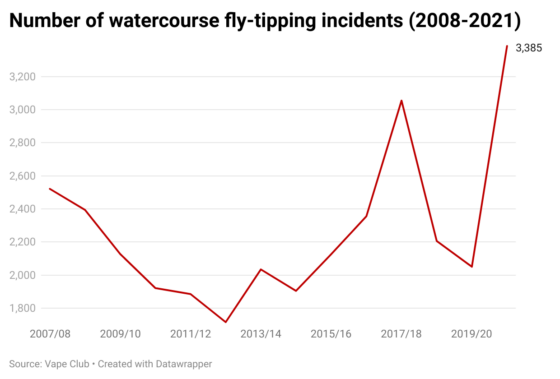
67% increase in fly-tipping in UK watercourses

The UK recorded 1.1 million incidents of fly-tipping last year — the highest number recorded for over a decade, since 2008/09, with watercourses experiencing a 67 per cent increase in fly-tipping incidents, according to data from the Department for Environment, Food & Rural Affairs.
Those who enjoy the countryside in their free time are being encouraged to report incidents and vehicles involved in fly-tipping through the gov.uk website or FixMyStreet.

The litter goes beyond everyday items: over the last year, incidents of dumping tyres rose by a quarter and people discarding vehicle parts increased by 15 per cent. Posing even more of a health risk, there was a 47 per cent upturn in fly-tipping of chemical drums or oil/fuels. Offences can be punished with a maximum fine of £50,000, or even a jail sentence.
The Canal & River Trust has also spoken out on the issue saying that fly-tipping increased during the coronavirus pandemic and is a major problem.
Public footpaths and bridleways were affected particularly badly, with the highest number of fly-tipping incidents in 13 years — equating to 543 a day and a jump of 10 per cent compared to the previous year.
According to DEFRA, there are various ways to help alleviate England’s litter problem including:
- Support local groups and charities such as Keep Britain Tidy to tackle littering and educate communities
- Smokers should dispose of cigarettes – the most common form of litter globally – in a responsible manner, and those quitting smoking should practise responsible disposal of smoking cessation devices
- Organise company-sponsored clean-up days or start a litter action group through CleanupUK
Susie Burrage, ambassador and board member of the Global Recycling Foundation, says: “Many villages, towns and cities have seen junk piled up high in remote spots, as people clear out their homes to make space for offices.
“Many people wrongly believe their individual actions will not harm the environment. For example, cigarette butts (which take 10 years to decompose) leach toxic substances into soil and water. Just one cigarette butt can contaminate 200 litres of water.
“I believe fines have helped to change individual behaviour, but we must challenge and change consumer behaviour. People must be educated in the best ways of preserving our natural resources and given easy access to well-organised and efficient recycling systems.”
